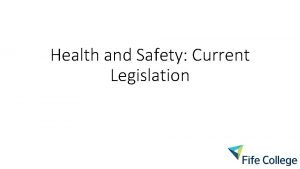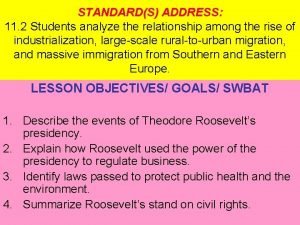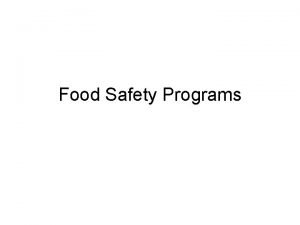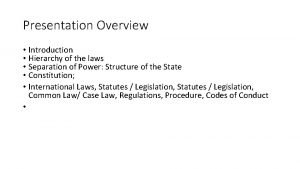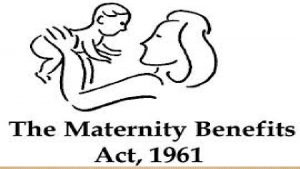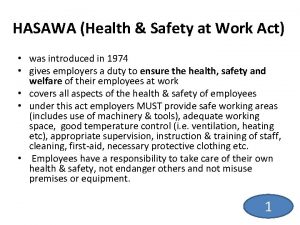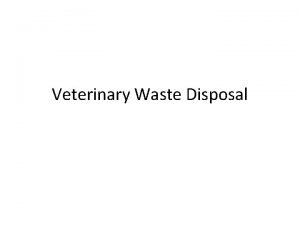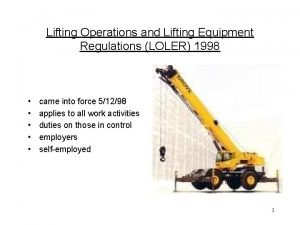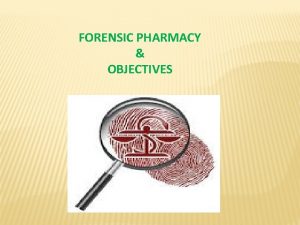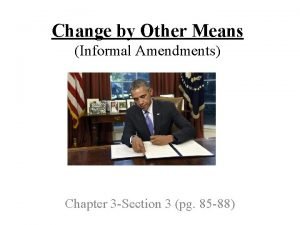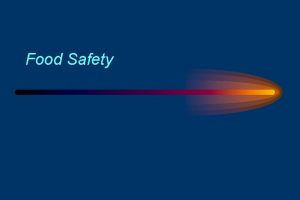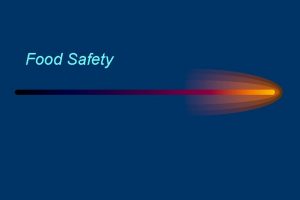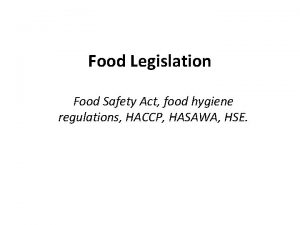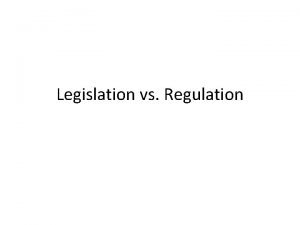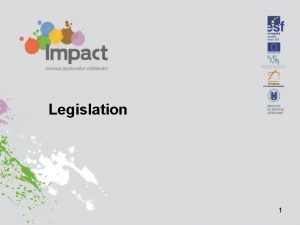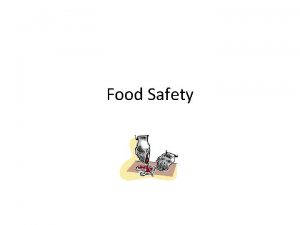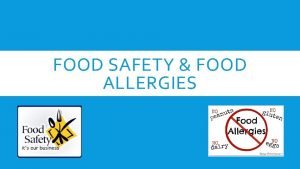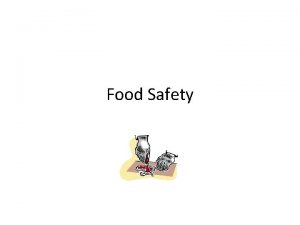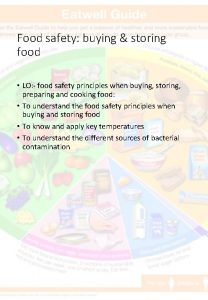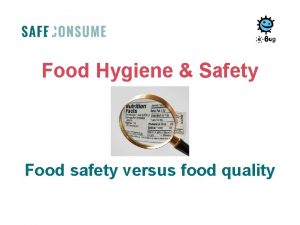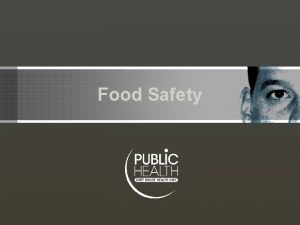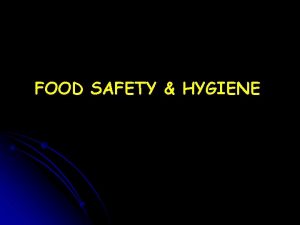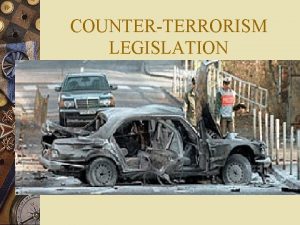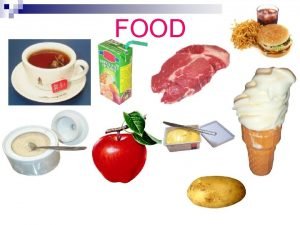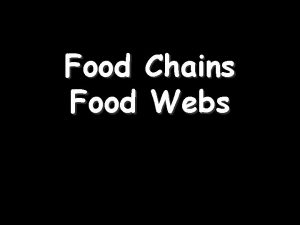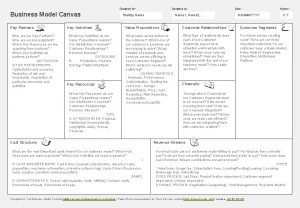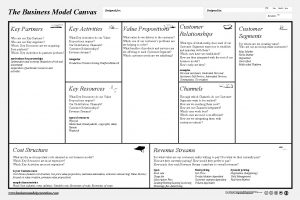FOOD SAFETY LEGISLATION Food Safety legislation is designed





















- Slides: 21

FOOD SAFETY LEGISLATION Food Safety legislation is designed to protect consumers from illness and harm

Food Legislation n The Food Safety (Northern Ireland) Order 1991 Regulation EC 852/2004 Food Hygiene Regulations (Northern Ireland) 2006

Role of Enforcement Officers n Authorised Officers – Environmental Health Officers n n Provide Food Safety advice Inspect food premises Enforce legislation covering food Investigate outbreaks of food -borne disease and possible offences

Powers of Enforcement Officers n n n Powers of entry Inspect food and premises Power to seize and detain food Serve notices Power to close Prosecute

Food Safety Law n n n n Safe Food Free from contamination Fit for human consumption Hygiene of food premises, equipment and personnel Hygienic practices (including temperature control) Control of food poisoning Composition, amount and labelling of food.

The inspection of food premises Purpose of inspection by an EHP • • Ensure operation is capable of producing safe food • Assess effectiveness of hazard analysis, especially in relation to critical control points (identify the risks) • • To check standards have been achieved (legal and industry guides) • • To provide advice/make recommendations • • Revisit • To ensure the business complies with the law. To identify foreseeable incidences of food poisoning Identify training needs of staff (competency) To respond to a complaint To continually improve food hygiene standards

Food Handler – Legal Requirements n n n Keep yourself clean Keep your workplace clean Protect food from contamination or anything that could cause harm Follow good personal hygiene practices Wear appropriate protective clothing Tell your employer if you are suffering from or are a carrier of a food-borne illness

Food Handler – Legal Requirements Legislation also states that food handlers must not: n n Do anything that would expose food to contamination Sell food that is unfit for human consumption Sell food with an expired date mark Work with food if they have symptoms of food poisoning

Notices n n A Hygiene Improvement Notice is used to require food businesses to improve something sub-standard A Hygiene Emergency Prohibition Notice can apply to: n n Premises (prohibiting use of premises) Part of premises Equipment A food business operator

Penalties for Non-Compliance n n n Prohibition from using part of business Fines and legal costs Prison sentence Closure of business Prohibition from running a food business Criminal record

Due Diligence The principal of defence under The Food Safety (Northern Ireland) Order 1991 A business must be able to demonstrate that it has done everything within its power to safeguard consumer health Accurate records are useful in proving this defence; these may include: n HACCP n Monitoring records – storage/cooking/delivery n Pest control n Cleaning schedules

What the Law Requires EC 852/2004 on Hygiene of Foodstuffs n Premises must: n Be registered with the local Council n Be kept clean n Be maintained in good repair n Have a good design, layout and construction n Have adequate facilities for washing equipment and food n Have satisfactory lighting and ventilation n Have adequate hand washing facilities

Contd…. n Equipment must: n n n Be kept clean and in good condition Be installed allowing cleaning in the surrounding area Waste must: n n n Not accumulate Be deposited in closable containers Prevent pest access

Contd… n Personnel must: Have high standards of personal hygiene n Wear clean protective clothing n Report to the proprietor when suffering from illness or a condition that may contaminate food n Be supervised and instructed and/or trained in food hygiene matters commensurate with their work activities n

Complying with Food Safety Law?

Food Safety Training n n Legal requirement Appropriate to tasks undertaken Recorded Refreshed

EC 852/2004 Article 5 Hazard Analysis (HACCP) Hazard Analysis Critical Control Point Hazard – anything that could cause harm to consumers HACCP is designed to help food companies to minimise the risk from food hazards

HACCP System Food companies need to: n Analyse the hazards to food safety n Assess the level of risk from each hazard n Decide the most critical points that require controls n Implement appropriate controls n Establish a monitoring system n Set up procedures to correct problems (corrective action) n Review the system when operations change

Record Keeping Legal requirement that certain records are kept as part of the HACCP-based food safety management system, eg: n n n Fridge/freezer records Cooking/hot-holding temperatures Cleaning records Training records Pest control checks

The Food Hygiene Regulations (Northern Ireland) 2006 n n n Applies to high-risk foods Cold foods- store below 8 o. C Hot foods – store above 63 o. C During service : n Cold food max 4 hrs at room temperature then discard or refrigerate n Hot food maximum 2 hrs at room temperature

Summary n n n Environmental Health Officers have wide-ranging powers to control food safety Controls are the responsibility of everybody Many penalties for non-compliance Due diligence defence available Record-keeping is a legal requirement Every business must carry out a Hazard Analysis
 Health and safety legislation
Health and safety legislation What legislation helped solve dangerous food and medicines
What legislation helped solve dangerous food and medicines Control measures for physical hazards
Control measures for physical hazards Hierarchy of legislation
Hierarchy of legislation National policy and legislation related to child health
National policy and legislation related to child health Codification of international law
Codification of international law Types of legislation
Types of legislation Legislation related to maternity benefits
Legislation related to maternity benefits Hasawa legislation
Hasawa legislation Traçabilité des soins infirmiers législation
Traçabilité des soins infirmiers législation Aviation legislation module 10 ppt
Aviation legislation module 10 ppt Tourism law thailand
Tourism law thailand Thailand former name
Thailand former name Legislation
Legislation Legislation vs regulation
Legislation vs regulation Veterinary waste disposal
Veterinary waste disposal Role of rrrlf in modernisation of libraries
Role of rrrlf in modernisation of libraries Ict ethics and legislation
Ict ethics and legislation Loler regulations 2018
Loler regulations 2018 Drug enquiry committee
Drug enquiry committee Eu audit legislation
Eu audit legislation Change by other means
Change by other means
